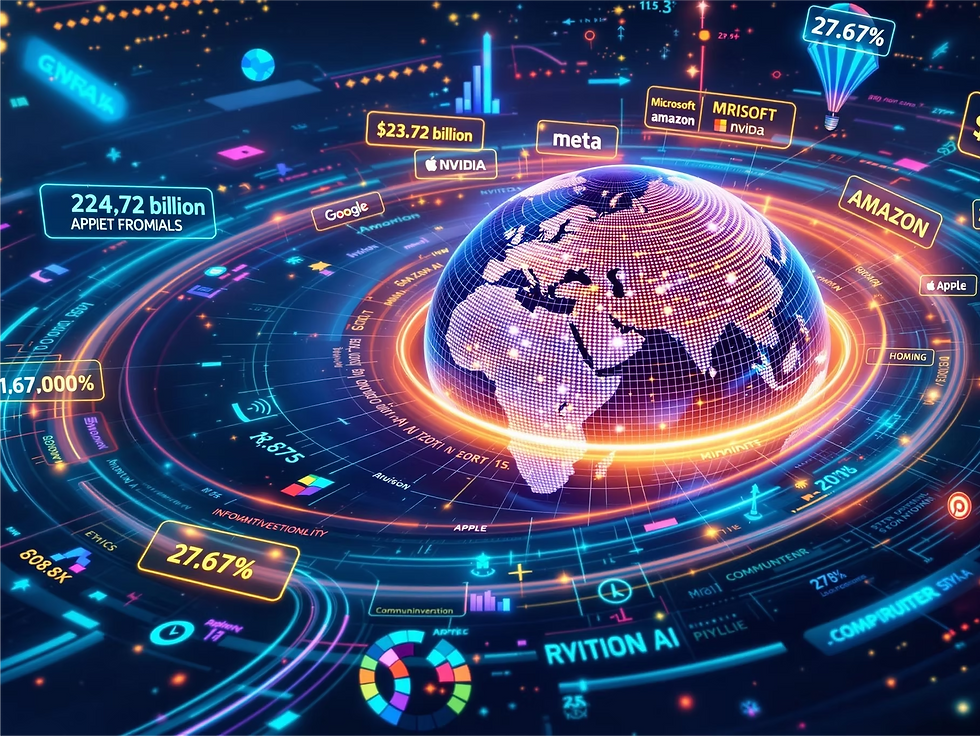The Global AI Race: Fight for AI Market Dominance in 2025
- Sep 12, 2025
- 4 min read

Artificial intelligence (AI) is no longer just a futuristic concept—it’s here, reshaping industries, businesses, and lives on a global scale. By 2025, the AI market is expected to reach an extraordinary $243.72 billion, marking a pivotal moment in the race for dominance in this revolutionary space. Behind the scenes, companies big and small are vying to lead this transformation, setting the stage for what could be the most significant technological competition of our time.
Why AI Competition Matters
The race for AI dominance isn’t just about creating smarter chatbots or more capable virtual assistants. It’s about setting the standards that will define the future of technology and business. Companies which emerge as leaders in AI innovation will improve customer engagement strategies, and even societal norms like social media. With analysts projecting a 27.67% compound annual growth rate through 2030—and a market volume expected to reach $826.73 billion by the end of the decade—the stakes couldn’t be higher. This competition drives enormous investment, innovation, and opportunity while raising important questions about responsibility and ethics.
The Players Shaping the Market
The competition is fierce, with companies like Google, Microsoft, Amazon, Meta, Apple, and NVIDIA leading the charge. Google vast data ecosystem powers advancements in AI reasoning, while Microsoft is working closely with OpenAI to pioneer cutting-edge models that push the boundaries of what AI can do. Amazon is embedding AI seamlessly into its services, making it an integral part of everyday operations. Apple is quietly advancing AI-enhanced user experiences that blend seamlessly into its product offerings.
Startups and emerging players are changing the game, too. Companies like Anthropic and Hugging Face are challenging the status quo with innovative approaches to AI development. Open-source initiatives are democratizing access to powerful tools such as building alternative AI ecosystems.
How Companies Compete: The Fight For AI Market Dominance
Success in the AI space requires a combination of strategy, innovation, and adaptability. Data acquisition has become a critical priority, as companies race to gather the comprehensive datasets needed to train increasingly sophisticated AI models. Talent recruitment is another key factor, with companies competing globally to secure the brightest minds in AI. At the same time, investment in advanced computing infrastructure, including custom-built hardware, is essential to handle the demands of modern AI workloads.
In the fight for AI market dominance, even collaboration has become a cornerstone of success. Strategic partnerships, like the one between Microsoft and OpenAI, show the benefit from combining their strengths. However, the fast-changing regulatory landscape and growing public scrutiny mean companies must also focus on building AI that is also responsible, ethical, and aligned with societal needs.
Trends Shaping AI in 2025
The AI landscape is evolving rapidly, with several key trends driving the next wave of innovation. AI reasoning, for example, is moving beyond simple pattern recognition to more advanced forms of logic and problem-solving. Agentic AI, or autonomous systems capable of executing complex tasks independently, is emerging as a powerful tool for businesses and industries.
On the hardware side, custom silicon designed specifically for AI applications is accelerating development, while edge computing is bringing AI capabilities directly to devices like smartphones, cars, and appliances. At the same time, responsible AI frameworks are becoming increasingly important, ensuring that ethical considerations and governance are built into every stage of AI deployment.
What This Means for Businesses and Individuals
The ongoing competition in AI is already delivering tangible benefits for businesses and consumers alike. Companies are gaining access to smarter tools that boost productivity, create personalized customer experiences, and open doors to new markets. For individuals, AI is making life easier and more intuitive, offering services that are tailored to personal preferences and automated to save time.
The impact of AI also extends beyond business and personal convenience. Communities are benefiting from AI-powered solutions to some of the world’s biggest challenges, including climate change, healthcare, and education. These innovations are not just improving quality of life—they’re creating opportunities for empowerment and progress on a global scale.
The Rise of Local Innovation
While global giants dominate headlines, smaller players and local innovators are proving that you don’t need a massive budget to make an impact. Companies like CNS are finding competitive advantages by focusing on community-driven solutions that address specific needs. By leveraging open-source tools, these businesses are achieving enterprise-grade capabilities at a fraction of the cost.
Transparency and trust are also key differentiators. Smaller companies are building strong relationships with their customers by prioritizing data security and ethical practices, giving them an edge that even the biggest tech giants can’t replicate.
Looking Ahead
As AI continues to evolve, staying informed about its trends and competitive dynamics is essential for anyone looking to thrive in this rapidly changing landscape. This race for market dominance isn’t just about technology—it’s about shaping the future of business, society, and everyday life.
The opportunities are vast, but they favor those who are prepared. Whether you’re a business leader, a tech enthusiast, or someone curious about the possibilities of AI, understanding its potential and challenges will be key to unlocking growth, innovation, and success in the years to come.



